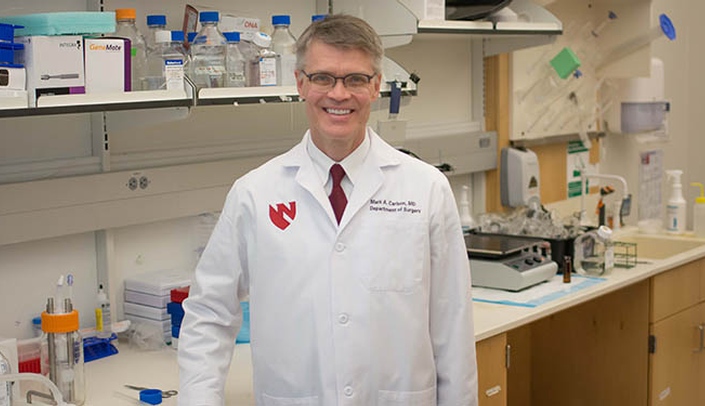UNMC has one of the world’s best pancreatic cancer research programs. UNMC’s team is a roster of research all-stars, including UNMC Scientist Laureates Tony Hollingsworth, Ph.D., and Surinder Batra, Ph.D.
But one reason so many great minds are working so hard is that pancreatic cancer needs breakthroughs in the worst way. While we are seeing progress in fighting many other cancers, pancreatic cancer has remained resistant to investigational attempts to control it. Thus, it has remained one of the most lethal cancers.
“We seem to be stalled,” said Mark Carlson, M.D.
And so Dr. Carlson, a surgeon-scientist who has a dual appointment at UNMC and the VA Nebraska-Western Iowa Health Care System, is hoping to give his colleagues a better research tool to study pancreatic cancer.
Dr. Carlson is working on the development of a porcine, or pig, model of pancreatic cancer. His team recently won $1.7 million for the project from the National Institutes of Health/National Cancer Institute.
A pig much more closely resembles humans in size, physiology, and DNA sequence, compared to the current go-to animal for modeling pancreatic cancer. A pig model will allow investigators to study potential diagnostic technologies and image-guided surgery. “That’s hard to do in a 20-gram mouse,” Dr. Carlson said.
He believes the NIH was impressed not only with his idea, but also with the strength of the team at UNMC. The team of nine investigators includes Dr. Hollingsworth, professor and director of pancreatic cancer research; Aaron Mohs, Ph.D., assistant professor of pharmaceutical science; and UNMC experts in bioinformatics, imaging, and pathology.
That’s also why Dr. Carlson decided to develop a porcine model for pancreatic cancer first — even though he believes the pig would be an excellent platform for modeling any number of other cancers.
“I picked pancreatic cancer because of the exceptionally strong effort in pancreatic cancer research here on the UNMC campus,” he said.
If successful, he plans to apply the idea to breast, esophagus, lung and colon/rectal cancers.
He hopes the new model will help scientists at UNMC and elsewhere make progress against pancreatic cancer.
As a scientific community, “We seem to have hit a brick wall,” with pancreatic cancer, Dr. Carlson said. “This model is intended to try to get past that.”

Mark ,
Congratulations on your NIH grant. Persistence pays off! Hal Maurer
Great work, Mark!
I would love to know more about this whole process, as my father died of pancreatic cancer in 2009
Audra Owens
This is a great team!
Congrats, Dr. Carlson. Sounds like an important step in battling this terrible cancer. Best of luck to you and your team!
Thank you! I have had 2 relatives die from pancreatic cancer…we need to figure out how to beat this!